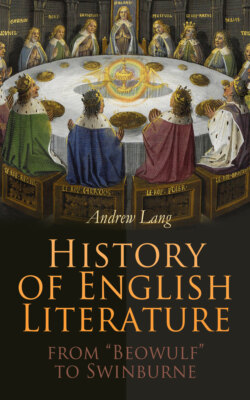Читать книгу History of English Literature from "Beowulf" to Swinburne - Andrew Lang, Robert Kirk - Страница 43
На сайте Литреса книга снята с продажи.
Devotional Books.
ОглавлениеBooks more purely devotional are "The Ayenbite of Inwyt" ("The Biting of Conscience") and "The Pricke of Conscience". The former states itself to be written "in English of Kent," by "dan Michelis of Northgate," and to be in the library of St. Austin's of Canterbury. The author, or rather translator from a French book of 1274, finished his writing in 1340. The author of "The Ayenbite" classifies sins and virtues in the allegorical manner: his moral advice, for example, as to the duty of giving alms promptly, gladly, and without the discourtesies with which too many accompany them, is excellent. But nothing, he says, is to be given to minstrels, he "calls their harmless art a crime". The dialect is uncouth and rather difficult.
"The Pricke of Conscience" is in octosyllabic rhyming couplets, about 10,000 lines in all, and is the work of a singular person, Richard Rolle, who, after being a wandering hermit, settled at Hampole, and died in 1349. A Latin biographer of Richard states that he was born at Thornton in the diocese of York, was well educated by the care of his parents, was sent to Oxford by Thomas Neville, Archdeacon of Durham, and made good progress in his studies, especially in theology. In his nineteenth year he left the temptations of Oxford, went home, and turned two dresses of his sister's, one white, one gray, into what he thought the appropriate costume of a hermit, covering his head with his father's rain-hood. His sister fled from before him, thinking him insane: he took Lady Dalton's seat in church, was allowed to preach a sermon, and was kindly received by the lady's husband, Sir John. In a cell provided by the knight he had unspeakable raptures, and felt as if he were being burned by a physical fire, which proved to be that of Divine love. Some ladies found him writing at a great pace, while he simultaneously discoursed to them for two hours. It seems to follow that either his writing or his preaching was "automatic". He wrought some miracles of healing, and he must have written rapidly indeed if he produced all the works attributed to him, His prose treatises of religion are as fervent as the Letters of Samuel Rutherford, the Covenanter: his anecdotes of his own temptation by the phantasm of "a full, fair young woman" who loved him dearly; and of a repentant scholar, who wrote out a list of his own sins which vanished from the paper, are interesting. He allows that the brains of eagerly pious people sometimes "turn in their heads," thereby causing empty hallucinations, and the hearing of wonderful songs that are merely subjective impressions. This strange being, with the ardour of Crashaw, had something of Crashaw's poetic fire.
